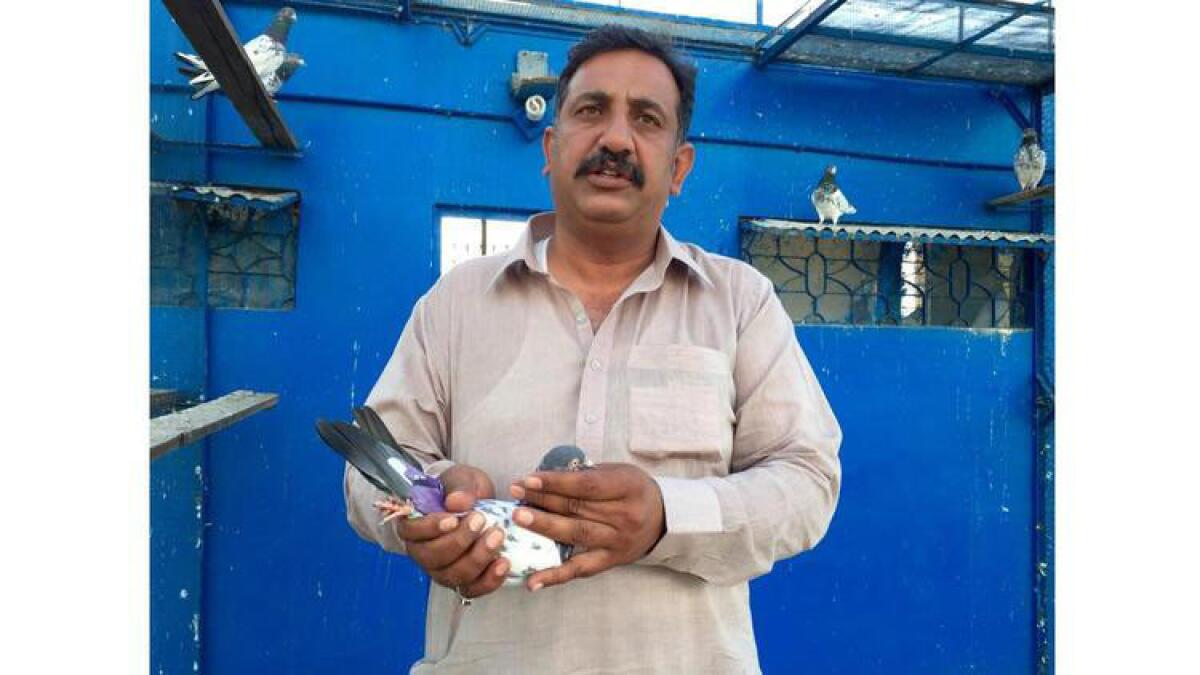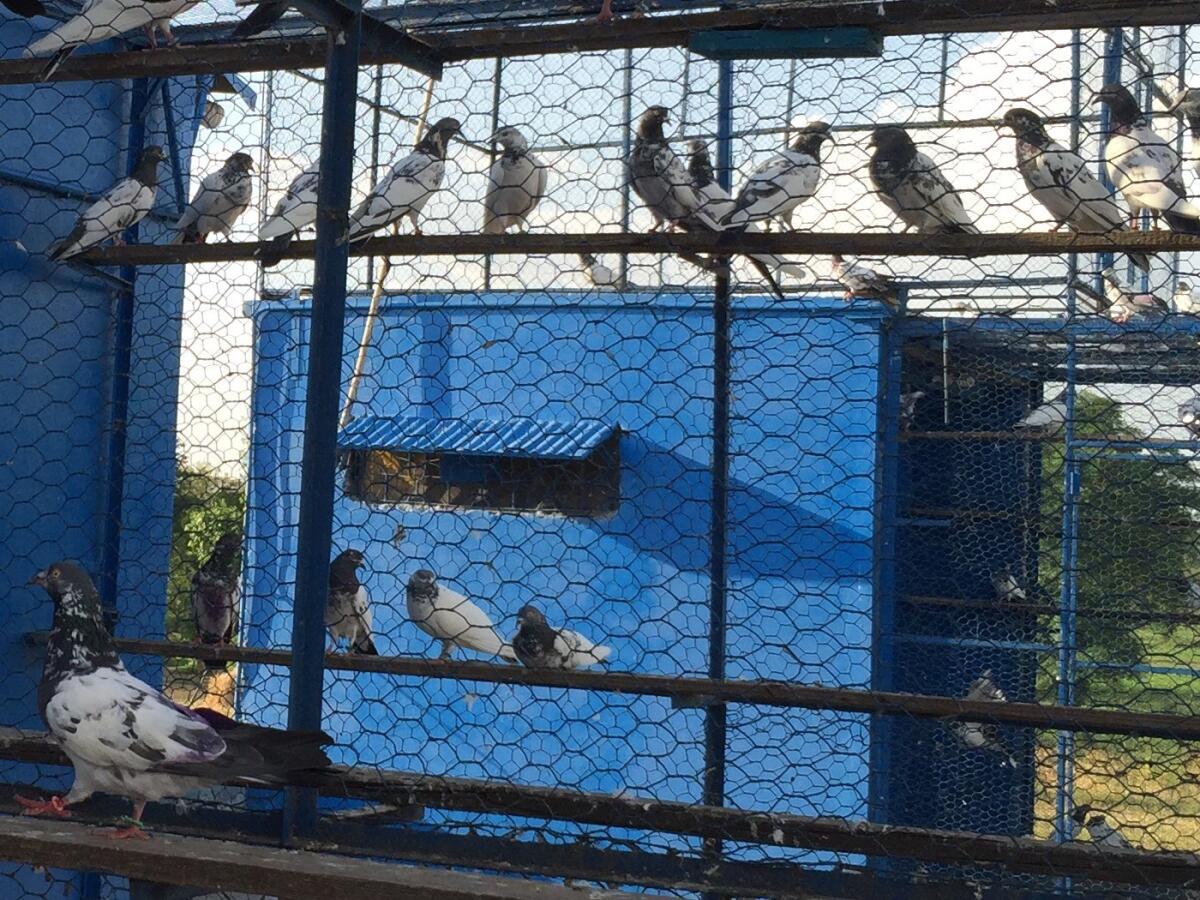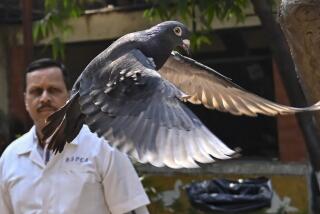The life of a racing pigeon in Pakistan: massages, steroids and the occasional Viagra

- Share via
Reporting from Jhelum, Pakistan — Outside an old farmhouse nestled among green fields, two men lay on a cot. With their feet propped against a teal-painted wall, they stared at a sky speckled with clouds, occasionally pointing upward and aiming a pair of binoculars.
The dark figure of a bird would suddenly be visible at a great height, gliding across the heavens, then flying out of view just as swiftly as it had appeared.
Bird watching is no idle exercise in these parts of Pakistan. Aloft that afternoon was a rare breed of racing pigeon worth hundreds of dollars – more than either man observing it earned in a month.
The pigeon is part of a stable of prized high-fliers belonging to Raja Iftikhar Ahmed, a businessman whose farm on the placid Jhelum River has become a rearing ground for big-time birds.
More than 300 of the winged specimens flap and flutter inside a series of custom-built, walk-in coops on the roof of Iftikhar’s farmhouse. Tall and broad-shouldered, with an enviably thick mustache, Iftikhar welcomed a visitor into the enclosure, its royal blue paint spattered with droppings.
“To your eyes they look like normal pigeons,” he said, pulling down one bird with a gray-blue crown and white feathers. He held it by the claws and lifted a wing to reveal a deep streak of indigo dye, applied as a sort of marathoner’s bib for the endurance races popular here.
People train pigeons all over the world – there are believed to be thousands of “pigeon fanciers” across the United States – but in Pakistan the niche pursuit boasts a particularly rich history. In the Mughal era, beginning in the 16th century, legend has it that carrier pigeons carried secret messages from royals to their men on the battlefield, or to their women in harems.
Nowadays, pigeon breeding, or kabootar parwar, is more of a hobby, though a serious one for men like Iftikhar. In the endurance races popular here, pigeon enthusiasts train their birds to stay aloft for as long as possible – usually for more than 12 hours at a stretch – before returning home.
There is no starting line: all the birds in a competition take off at the appointed time from their own perches, often many miles apart. The breeders watch from the ground with binoculars, but often the pigeons are out of sight. The moment one returns to its perch, the clock stops; landing anywhere else can mean disqualification – if the bird is caught.
Judges circulate among the breeders and perform spot checks, but the competitions are based largely on the honor system. Each pigeon wears a silicon band around one leg with its owner’s phone number, to help track strays.
“They are trained not to land anywhere else,” Iftikhar said. “This is a matter of respect for our sport.”
Three times, he has won an annual tournament here in the eastern province of Punjab. Five years ago he was runner-up in an international competition hosted by the United Arab Emirates, when his birds flew for a combined 1,082 hours over 11 days.

Once someone asked Iftikhar to part with one of his best fliers, a blue-headed female Sialkot pigeon named Topiwali (“the one with the cap”), in exchange for a new Toyota sedan. Iftikhar declined.
“This is more than a game for us,” he said. “It’s a tradition.”
Iftikhar, 44, learned the pastime from his father, who picked it up while working for a royal family in the Persian Gulf. When Iftikhar moved to Britain about two decades ago, he tried to breed pigeons on the roof of his home outside London, but he found the wet, gray conditions less than ideal.
His flock seems to do better on the rooftop in Jhelum, a farming area two hours outside Islamabad. On Iftikhar’s 10 acres of land, where he grows wheat and raises cattle, a staff of several men rotate through the farmhouse to tend to the coop or let the birds out for practice runs.
The afternoon before a recent race, his best birds – including three that he said were gifts to him from Bahraini royalty – were resting inside the wire enclosure under a hand-painted sign that read, “Alhamdulillah,” or “Praise be to Allah.” Later, as part of the pre-race routine, they would have their wings massaged.
This is more than a game for us. It’s a tradition.
— Pakistani pigeon enthusiast Raju Iftikhar Ahmed
Downstairs, an elderly man in a fraying white kurta ground up food for the birds in a large pot. Here was the secret of a successful pigeon breeder, Iftikhar said: If you fed the birds well, they could fly for hours and hours without feeling fatigue.
He was circumspect about the exact composition of his prize-winning formula, but it was a mixture of gram, millet, almonds, cardamom, herbs and, at times, enhancers that have been banned from other sports.
Unlocking a metal cabinet, he pulled out a sheet of white tablets that he said were steroid pills. They would be ground up into the mixture, which would be shaped into pellets the width of an index finger and fed to the birds.
“The steroids keep them from getting thirsty, so they can fly for 10 or 12 hours,” he explained. “It’s allowed. So are muscle relaxers. You can do anything you want in this sport, really. I’ve even fed the pigeons Viagra.”
Iftikhar allowed that to settle in for a moment, then broke into a grin – a subtle acknowledgement that the diet might not exactly be healthy for the birds. Pakistan doesn’t have much of an animal rights movement, but a constituency closer to home fervently opposes Iftikhar’s peculiar, expensive hobby.
“My wife hates it,” he said with a laugh.
Follow @SBengali on Twitter for more news from South Asia
More to Read
Sign up for Essential California
The most important California stories and recommendations in your inbox every morning.
You may occasionally receive promotional content from the Los Angeles Times.











